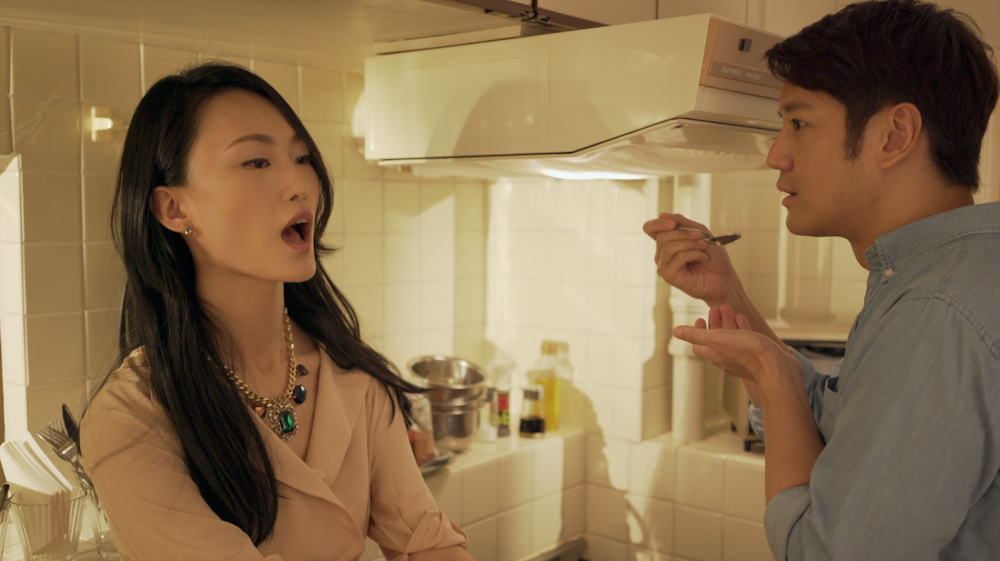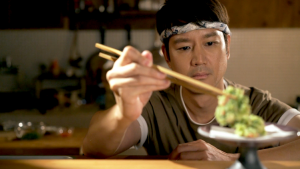
A Chinese Singaporean chef formerly working in Tokyo, finds himself in Okinawa begging a disgruntled old chef to teach him traditional Okinawan food. A top Japanese food critic finds herself in Singapore on an eye opening discovery of Southeast Asian cuisine.
| Reviewed by: Goh Kai En
Being a film student is tough, but it doesn’t come without its benefits, such as amazing opportunities to catch free movie screenings. For me, I had the pleasure to watch Jimami Tofu four years after its original release, courtesy of Cinewav. Jimami Tofu is a beautiful romantic tale about cooking. This sentimental drama follows Ryan, a Singaporean chef who retreats to Okinawa in search of a long-lost love, Yuki. In the midst of his heartbreak, he is introduced to traditional Okinawan dynastic cuisine, namely the dish “jimami tofu”. The food inspires Ryan to start cooking again, becoming the protege of a local chef and following in his footsteps, even going so far as to take over the restaurant after his death. The film starts off rocky, with its first half being a multi-linear plot. We flit between Ryan and Yuki’s past, and their completely separate futures. It is easy to get lost in the chronological flow, particularly since the transitions between events are not especially smooth and there are few obvious distinctions. Thankfully, the sequence of events gains clarity in the second half as Ryan and Yuki find their lives intertwined once again.
The strength and beauty of the story are more evident here. There are many tear-jerking moments in the second half filled with sincerity and emotion. In most of these scenes, food takes centre-stage, which truly demonstrates how powerful of a storytelling tool it is, and yet how under-utilised it was. While Jimami Tofu is built around food rather than rooted in it, the best moments of the film shine through when the latter is employed. For that, the film, with all its merits, leaves much to be desired in its story. Every scene is a treat for the eyes, and while the Okinawan landscape lends much of its picturesque beauty to the film, there is no denying the masterful direction and cinematography behind Jimami Tofu. Directors Christian Lee and Jason Chan vividly portrayed the emotional depth of the characters in many scenes, through brilliant composition and framing, a commendable feat of both cast and crew. The use of naturalistic lighting also brings to life the characters, with the unique atmosphere capturing them ethereally, making for an enjoyable watch that pleases the eyes.
Beyond cinematography, the composer for Jimami Tofu is an unsung hero, using music to brilliantly elevate the accompanying scenes to new heights. There is often little dialogue in these scenes, allowing the music to take centre-stage and act as its own “dialogue” of sorts to give the scenes more emotional depth. The magic of the score really shines through near the end, with a montage of Ryan preparing one final meal for Yuki. The moving music evokes in you a bittersweet sense of love and longing, setting you in the shoes of Yuki to experience the moment as she does. A combination of beautiful cinematography and music, this scene is genuinely heartfelt and sentimental, and is one of the strongest moments of the film. Watching Jimami Tofu is a breathtaking experience. For me, I could really feel the heart and soul behind the production. While there are still gripes to be had with the story, one thing that is still commendable is how the team behind the film did Okinawa much justice. They were not only able to showcase Okinawa in all its glory, but also capture its culture and history in an engaging way. Just as you don’t watch a foodie flick on an empty stomach, Jimami Tofu will strike a heart pining for Japan right where it hurts. _ Goh Kai En is a student at Ngee Ann Polytechnic studying Film, Sound and Video. An avid fan of local and animated films (especially the works of Studio Ghibli), he loves all forms of creative writing, and aspires to be a screenwriter someday. |
Click Here For More Film Reviews
Do you love writing? Send us a film review and we will feature it on our website. Any film that people can see in the theater or online. Email to: media@scape.sg
This review is also published on Sinema as part of *SCAPE’s Film Critics Lab: A Writing Mentorship Programme.



